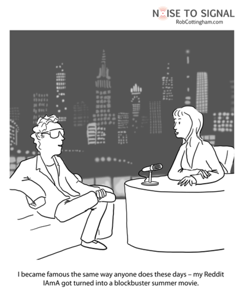If you hang out on Reddit, then you’re probably well acquainted with the phenomenon of the IAmA. It stands for “I am a…” and usually ends with either “AMA” (“ask me anything”) or “AMAA” (“ask me almost anything”).

It’s also one of the most fascinating things the web’s offered in a while – which, given that it’s entirely text-based, is pretty remarkable.
The concept is simple: someone steps forward, identifies something remarkable about themselves to the Reddit community, and invites questions — for instance, “IAMA former DisneyWorld employee… AMAA“. And then the questions and answers start to fly.
The results are often glimpses into worlds we often don’t see; as I write this, an IAmA from a man who “was in a BDSM 24/7 total power exchange relationship for 3 years” is having a frank discussion with a few dozen Redditors (including a few admirably measured responses). Or maybe you might have enjoyed “IAmA Nerfer – I mod Nerf guns for enhanced function and occasionally alter appearance for costume pieces.” Or “I am youtube user Cotter548, AKA the inventor of the Rickroll. AMA.“
It’s not all wonderful. Some IAmA’s don’t catch fire, and most get their share of dumb comments and idle banter. But the actual conversation, particularly from the subject of the IAmA, is often riveting.
Sometimes the appeal is voyeurism. Sometimes it’s the chance to open up to someone who shares some deeply personal pain of yours.
But mostly, when it works well, it’s because IAmA lets us connect with another person on some of their most interesting terrain, or broadens our understanding of a phenomenon of the moment. I was one of those who was blown away by Zach Wahls, the 19-year-old whose articulate, powerful defence of his two mothers became a viral rallying point for supporters of marriage equality. Coming across his IAmA was a little like actually getting to meet the guy.
We get very taken with technologically intensive ways of making digital conversation more appealing and engaging. But it’s worth remembering that some of the most compelling interactions we have — whether they’re in tomorrow’s 1080p 3D video with aroma-enabled augmented reality, or the kind of extended plain-text comment thread I could have read 30 years ago on dial-up — are the ones that let us share a little of each other’s authentic lives.


















